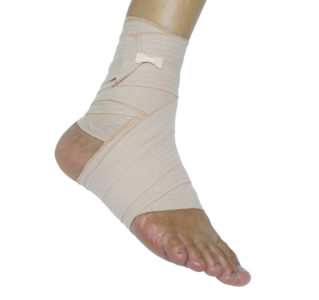 Ankle taping can help to provide support to your ankles during athletic activity, but it’s a little like putting a band-aid on a stab wound. While it may help a little, it’s really not going to due much for the underlying problem. Taping can provide a little extra support, but it’s not going to help restrengthen your ankle ligaments. In fact, taping can actually cause stress to channel through other parts of your foot and ankle, which could expose you to other injuries.
Ankle taping can help to provide support to your ankles during athletic activity, but it’s a little like putting a band-aid on a stab wound. While it may help a little, it’s really not going to due much for the underlying problem. Taping can provide a little extra support, but it’s not going to help restrengthen your ankle ligaments. In fact, taping can actually cause stress to channel through other parts of your foot and ankle, which could expose you to other injuries.
Now, that’s not to say that ankle taping doesn’t have a place in this world. For individuals with a mild acute ankle sprain, taping the ankle during the recovery process can help to prevent against a recurrence. However, if you have ankle instability, or you suffer from chronic ankle sprains, you’re going to want to do more for your ankle than just tape your ankle.
Instead of Taping
If you suffer from chronic ankle instability, here are some treatment methods that will prove more effective in the long run:
Physical Therapy – Physical therapy will work to help restrengthen the ankle joint and the supporting ankle ligaments. An active treatment option like physical therapy is very important when trying to address chronic ankle instability.
Stretching/Exercise – Along a similar vein, targeted stretches and controlled exercise like walking or jogging on a smooth surface are great ways to help strengthen ligaments and muscle groups.
Resistance Training – Resistance training is another good way to work on your ankle ligaments, but it’s a good idea if you do it in an environment where you’re not full weight bearing, like in a pool.
See A Specialist – One final treatment option that works better than taping is visiting a foot and ankle specialist like Dr. Silverman. He’ll be able to figure out which ligaments are causing you problems, and he can recommend some individualized options. In some cases, he can even perform a minimally invasive procedure to reinforce the ligaments, and you can have stronger ankle ligaments than you had prior to your injury! Learn more about the procedure and your options below.